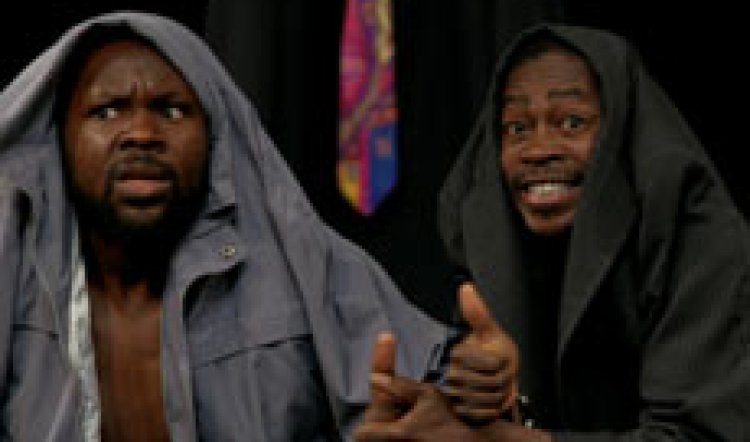
Sizwe Banzi Is Dead
Sizwe Banzi Is Dead, the Playhouse theatre, Sydney Opera House, November 27-December 9, 2007; ph: +612 9250 7777 or www.sydneyoperahouse.com
Sizwe Banzi Is Dead is one of a handful of rightly famous and influential plays that came out of a long collaborative relationship between Athol Fugard, John Kani and Winston Ntshona and their company, the Serpent Players.
They first began working together in Cape Town: a radical and dangerous act in itself for the white Fugard and the black actors during the Apartheid ascendancy. The plays were considered radical and dangerous - virtually intolerable - to the South African authorities because, although suppressed and reviled at home, audiences in London and on Broadway, were prepared to pay good money to see them.
Sizwe Banzi won the London Theatre Critics' award for best play of 1974. Later, after a triumphant season in New York in 1976 (Tony award and all) Kani and Ntshona were arrested soon after their return to South Africa and held in solitary confinement for more than three weeks.
Their real offence was what Afrikaner-Apartheid South Africa hated more than anything: they were "uppity blecks", as my grandmother would have said. Underlying that was the refusal of the men to accept that Apartheid was either immutable or unbeatable. Fugard, Kani and Ntshona had been irritants to the White regime since 1965 when they first began producing agitprop theatre.
This was all the more remarkable in the context of an era when, with the notable exception of writers (Fugard, Breytenbach, Leroux and Brink, for instance) the notion of Afrikaner South African culture was laughable; the zenith of Afrikaner arts and culture was the lumpen monstrosity of the Voortrekker Monument in Pretoria; and Afrikaner popular culture on the world stage was represented by pop singer Eve Boswell's two anodyne hits, Suikerbossie (Sugar Bush) and Pickin' a Chicken.
The Fugard-Kani-Ntshona works of those years are Master Harold and the Boys, The Island, Statements After An Arrest Under The Immorality Act and probably the most renowned and well-traveled South African political drama of that time: Sizwe Banzi.
Each deals with the various realities of Apartheid for those who lived under its grim influence. There is the dawning realisation of racism for a young white boy in the somewhat autobiographical Master Harold; Nelson Mandela's 26 years in prison on Robben Island informs The Island; while the surreal nature of human relations in a state which had enacted - and vigorously policed - an abomination called the "Immorality Act" is the subject of the third of a loose trilogy known as the Statement plays.
Sizwe Banzi Is Dead is of the era too, but its politics are hardly less potent now, 13 years on from the first free elections in South Africa (free to the black majority, that is). The white minority no longer legally oppresses Black South Africans, but that doesn't mean they are not oppressed: by poverty, big business and official corruption. In many ways, little has changed for the majority and that makes Sizwe Banzi a resonant and sobering drama - even, or maybe especially - because of its buoyant humour and comic, Kafkaesque absurdity.

Sizwe Banzi hinges on the bitter-tasting advice of the upwardly mobile and savvy Styles (Habib Dembele) to his more naïve friend Buntu (Pitcho Womba Konga) when he tells him: "Your number is more important than your name."
Like most normal people, Buntu associates his name with his identity - it is precious to him - but the government requires him to carry his Native Identity Passcard (with its all-important number) at all times: without it he is illegal. In this instance he is illegal because it does not permit him to be in the city where he needs to be to earn a living and support his family (back home on a distant Bantustan).
The Apartheid regime was not the first to work out that dehumanising a person by turning them into a number was an easy step towards control. It will not be the last. Australia has gone some distance down similar paths with its off-shore detention camps, "Pacific solutions" and land-grabbing "interventions" - make a person into a cipher or a slogan and who cares about their rights or wellbeing?
Identity is part and parcel of Sizwe Banzi - a photographer who was once a worker on the Ford production line now captures and creates identities for his customers: he supplies a snappy suit and hat so a man may let his distant wife or parents know he is doing well in the big city. In this instance, when a dead man yields a convenient passbook, he eventually convinces his friend to assume the man's identity and leave his own - less useful - one with the corpse.
It is a wrenching struggle and one that tells us much about who we think we are and how important that is; it also highlights how much more important identity is to a person who has little else.
This production, by Peter Brook and in French with unobtrusive surtitles, is a delight. It moves lightly and fluently through the phases of storytelling unhindered by setting (a few cardboard boxes and some mobile and useful metal frames) or by any sense of anger or futility. The two actors bring such verve, humour and generosity to their roles it serves to make the true awfulness of the situation worse and better in equal measure.
Seventy-five minutes is all it takes to transport the audience back to a simpler, more savage time while at the same time illustrating that, in so many ways, the more things change the more they stay the same.



